Unit 1 Where did you go on vacation?Section B知识点学案
文档属性
| 名称 | Unit 1 Where did you go on vacation?Section B知识点学案 | 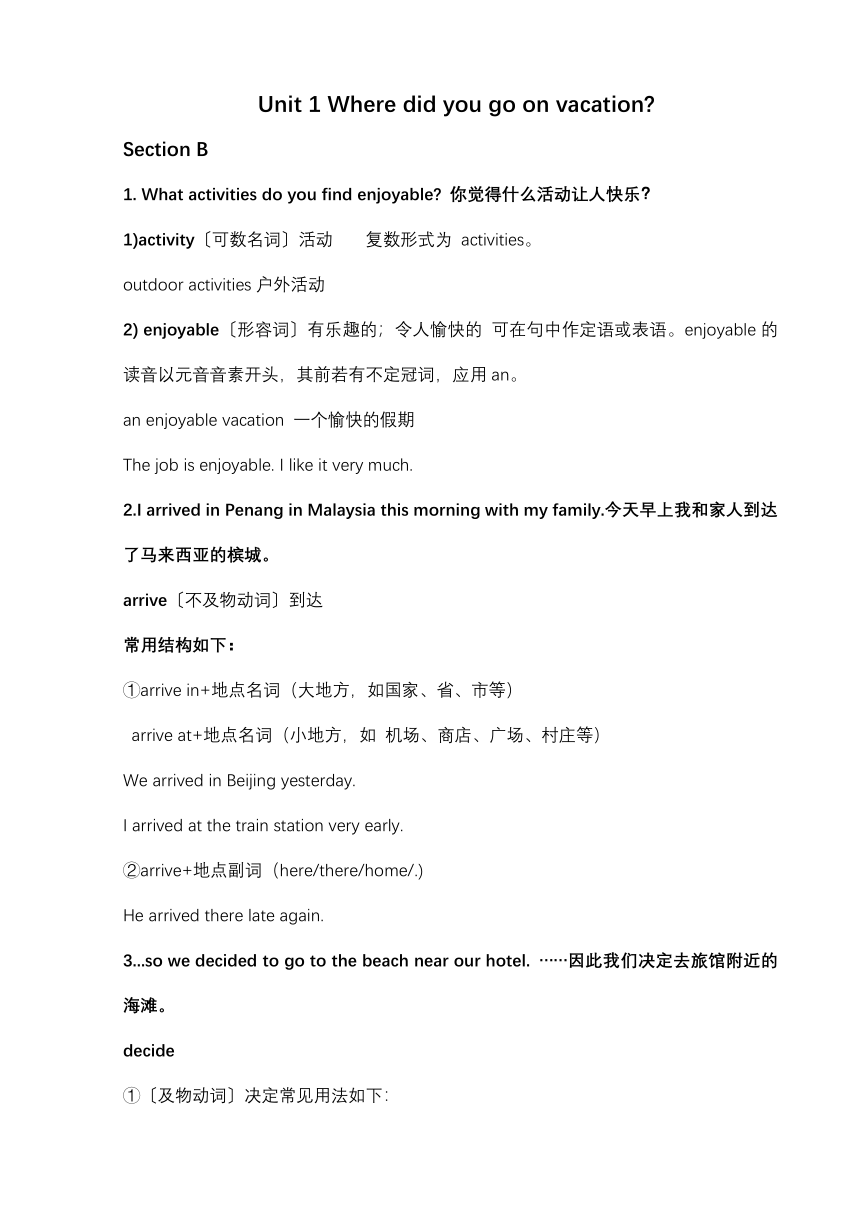 | |
| 格式 | docx | ||
| 文件大小 | 52.9KB | ||
| 资源类型 | 教案 | ||
| 版本资源 | 人教新目标(Go for it)版 | ||
| 科目 | 英语 | ||
| 更新时间 | 2023-07-09 21:36:36 | ||
图片预览

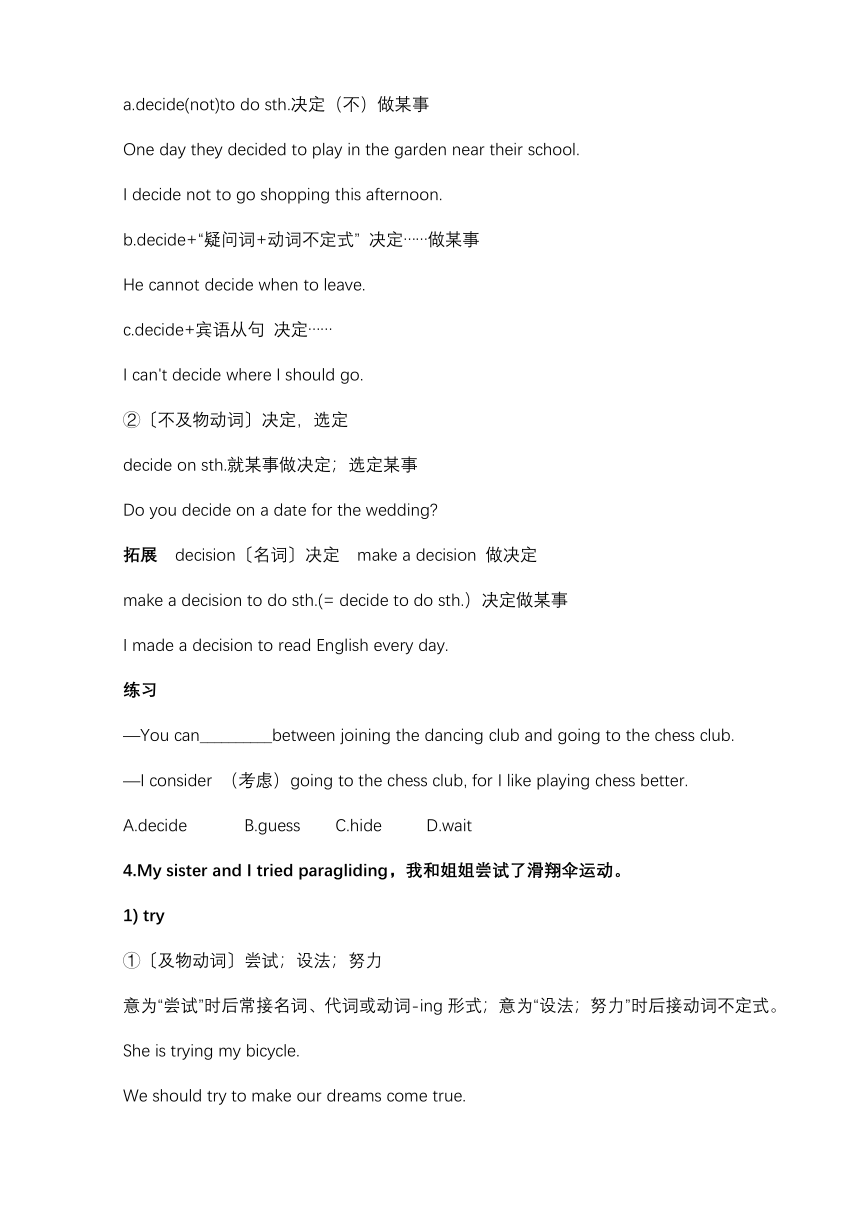
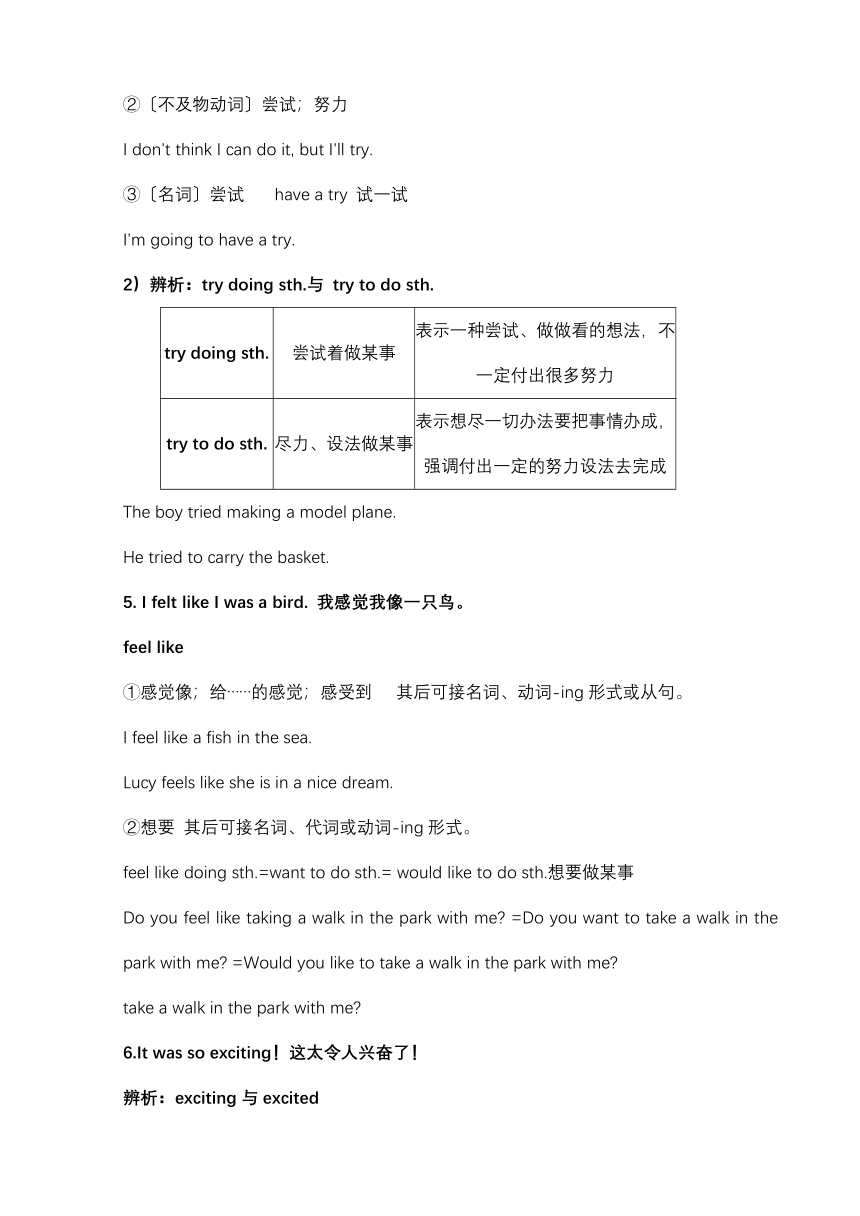
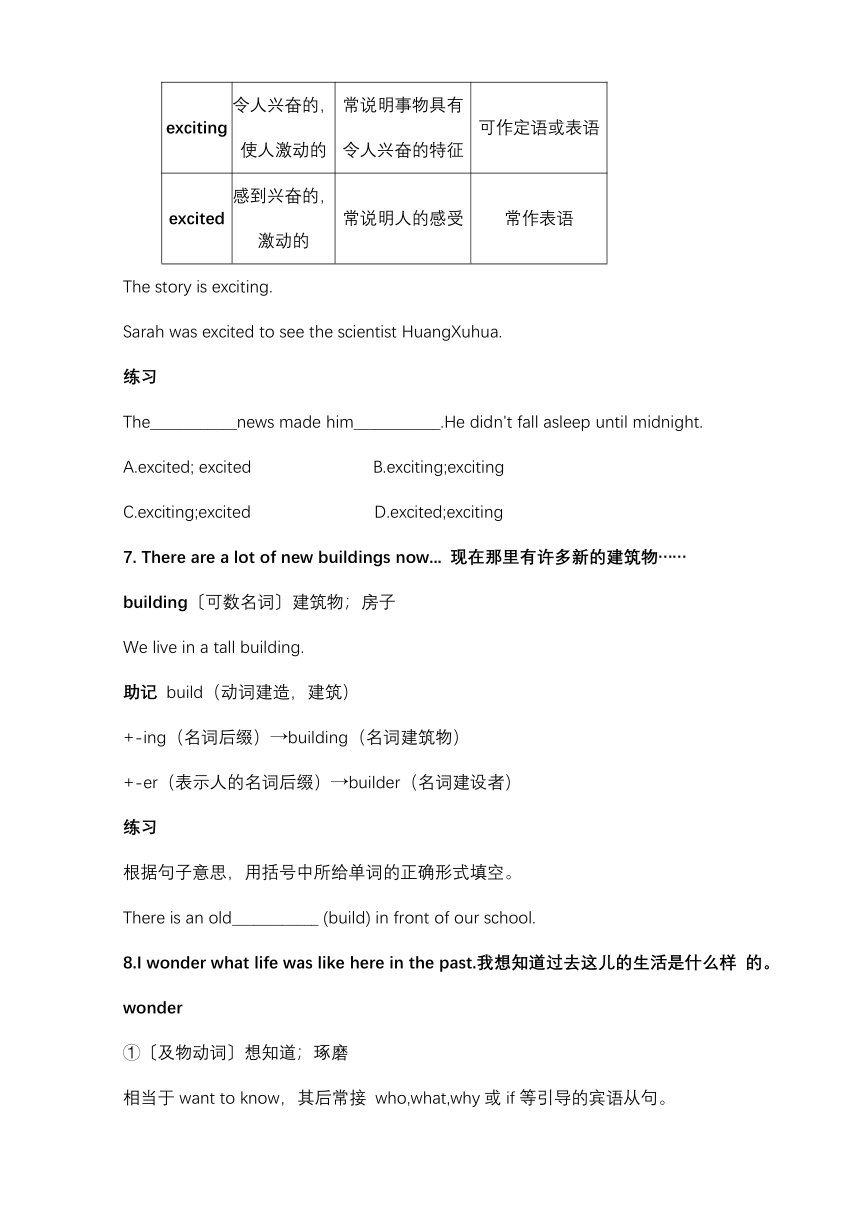
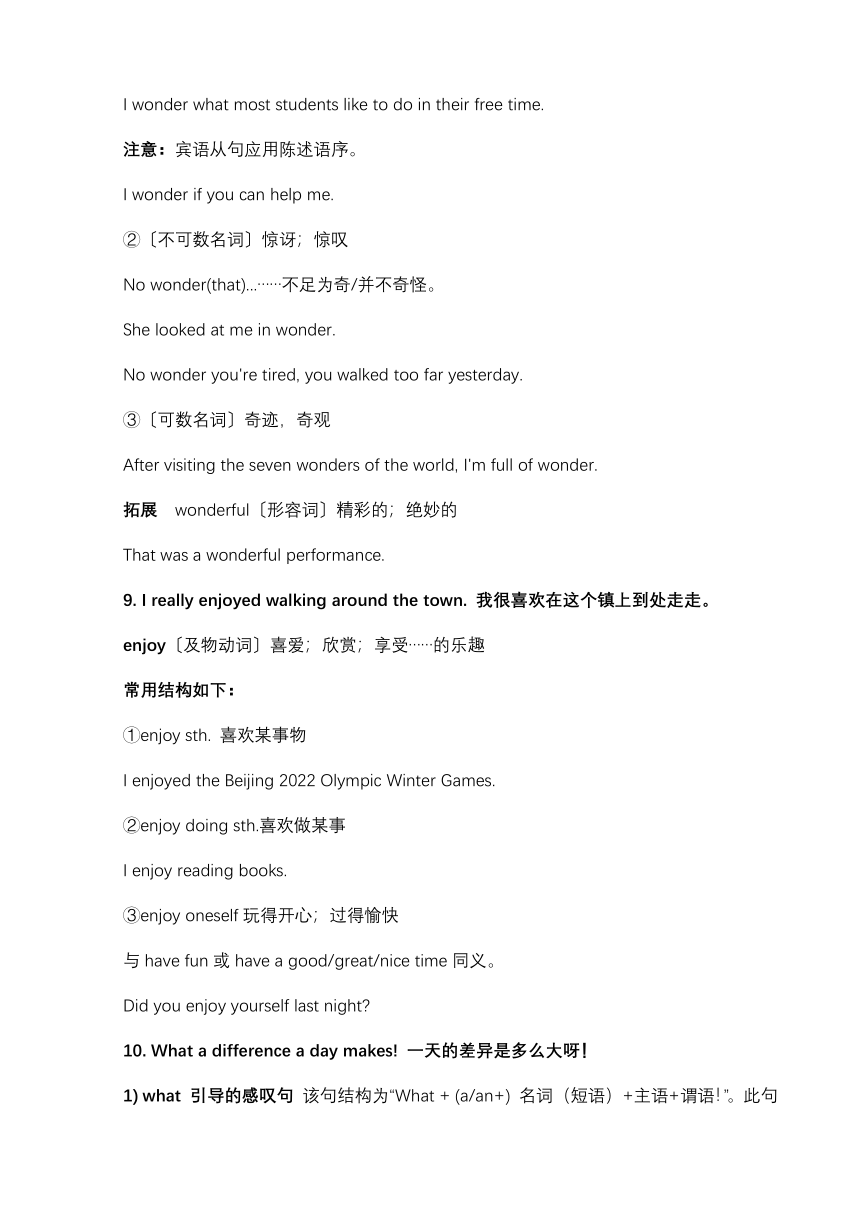
文档简介
Unit 1 Where did you go on vacation
Section B
1. What activities do you find enjoyable 你觉得什么活动让人快乐?
1)activity〔可数名词〕活动 复数形式为 activities。
outdoor activities户外活动
2) enjoyable〔形容词〕有乐趣的;令人愉快的 可在句中作定语或表语。enjoyable的读音以元音音素开头,其前若有不定冠词,应用an。
an enjoyable vacation 一个愉快的假期
The job is enjoyable. I like it very much.
2.I arrived in Penang in Malaysia this morning with my family.今天早上我和家人到达了马来西亚的槟城。
arrive〔不及物动词〕到达
常用结构如下:
①arrive in+地点名词(大地方,如国家、省、市等)
arrive at+地点名词(小地方,如 机场、商店、广场、村庄等)
We arrived in Beijing yesterday.
I arrived at the train station very early.
②arrive+地点副词(here/there/home/.)
He arrived there late again.
3...so we decided to go to the beach near our hotel. ……因此我们决定去旅馆附近的海滩。
decide
①〔及物动词〕决定常见用法如下:
a.decide(not)to do sth.决定(不)做某事
One day they decided to play in the garden near their school.
I decide not to go shopping this afternoon.
b.decide+“疑问词+动词不定式” 决定……做某事
He cannot decide when to leave.
c.decide+宾语从句 决定……
I can't decide where I should go.
②〔不及物动词〕决定,选定
decide on sth.就某事做决定;选定某事
Do you decide on a date for the wedding
拓展 decision〔名词〕决定 make a decision 做决定
make a decision to do sth.(= decide to do sth.)决定做某事
I made a decision to read English every day.
练习
—You can__________between joining the dancing club and going to the chess club.
—I consider (考虑)going to the chess club, for I like playing chess better.
A.decide B.guess C.hide D.wait
4.My sister and I tried paragliding,我和姐姐尝试了滑翔伞运动。
1) try
①〔及物动词〕尝试;设法;努力
意为“尝试”时后常接名词、代词或动词-ing形式;意为“设法;努力”时后接动词不定式。
She is trying my bicycle.
We should try to make our dreams come true.
②〔不及物动词〕尝试;努力
I don't think I can do it, but I'll try.
③〔名词〕尝试 have a try 试一试
I'm going to have a try.
2)辨析:try doing sth.与 try to do sth.
try doing sth. 尝试着做某事 表示一种尝试、做做看的想法,不一定付出很多努力
try to do sth. 尽力、设法做某事 表示想尽一切办法要把事情办成,强调付出一定的努力设法去完成
The boy tried making a model plane.
He tried to carry the basket.
5. I felt like I was a bird. 我感觉我像一只鸟。
feel like
①感觉像;给……的感觉;感受到 其后可接名词、动词-ing形式或从句。
I feel like a fish in the sea.
Lucy feels like she is in a nice dream.
②想要 其后可接名词、代词或动词-ing形式。
feel like doing sth.=want to do sth.= would like to do sth.想要做某事
Do you feel like taking a walk in the park with me =Do you want to take a walk in the park with me =Would you like to take a walk in the park with me
take a walk in the park with me
6.It was so exciting!这太令人兴奋了!
辨析:exciting与excited
exciting 令人兴奋的,使人激动的 常说明事物具有令人兴奋的特征 可作定语或表语
excited 感到兴奋的,激动的 常说明人的感受 常作表语
The story is exciting.
Sarah was excited to see the scientist HuangXuhua.
练习
The____________news made him____________.He didn't fall asleep until midnight.
A.excited; excited B.exciting;exciting
C.exciting;excited D.excited;exciting
7. There are a lot of new buildings now... 现在那里有许多新的建筑物……
building〔可数名词〕建筑物;房子
We live in a tall building.
助记 build(动词建造,建筑)
+-ing(名词后缀)→building(名词建筑物)
+-er(表示人的名词后缀)→builder(名词建设者)
练习
根据句子意思,用括号中所给单词的正确形式填空。
There is an old____________ (build) in front of our school.
8.I wonder what life was like here in the past.我想知道过去这儿的生活是什么样 的。
wonder
①〔及物动词〕想知道;琢磨
相当于want to know,其后常接 who,what,why或if等引导的宾语从句。
I wonder what most students like to do in their free time.
注意:宾语从句应用陈述语序。
I wonder if you can help me.
②〔不可数名词〕惊讶;惊叹
No wonder(that)...……不足为奇/并不奇怪。
She looked at me in wonder.
No wonder you're tired, you walked too far yesterday.
③〔可数名词〕奇迹,奇观
After visiting the seven wonders of the world, I'm full of wonder.
拓展 wonderful〔形容词〕精彩的;绝妙的
That was a wonderful performance.
9. I really enjoyed walking around the town. 我很喜欢在这个镇上到处走走。
enjoy〔及物动词〕喜爱;欣赏;享受……的乐趣
常用结构如下:
①enjoy sth. 喜欢某事物
I enjoyed the Beijing 2022 Olympic Winter Games.
②enjoy doing sth.喜欢做某事
I enjoy reading books.
③enjoy oneself玩得开心;过得愉快
与have fun或have a good/great/nice time同义。
Did you enjoy yourself last night
10. What a difference a day makes! 一天的差异是多么大呀!
1) what 引导的感叹句 该句结构为“What + (a/an+) 名词(短语)+主语+谓语!”。此句式所强调的成分是what后面的名词 (短语),主语和谓语可省略。
What fun today is!
What a wonderful weekend we had!
注意:此句式中名词为可数名词单数时,名词前须有不定冠词a/an。
拓展:感叹句是表达喜、怒、哀、乐以及惊奇、惊讶等强烈感情的句子。感叹句主要由what和how引导,具体结构如下:
①What+a/an+形容词+可数名词单数(+主语+谓语)!
What an interesting book (it is)!
②What+形容词+复数名词/不可数名词(+主语+谓语)!
What beautiful flowers (they are)!
What fine weather it is today!
③ How+形容词/副词+主语+谓语!
How beautiful she is!
How well he plays the piano!
助记:感叹句的用法
感叹句,不麻烦,how或what在句前。修饰名词用what, how与形、副紧相连。主语、谓语不用变,省掉它们很常见。
练习
—Shenzhou XIV carried three Chinese astronaut into space successfully.
—Wow,____________exciting news!We are so proud.
A.what B.what a C.what an D.how
2)difference〔名词〕差别;差异
形容词形式为different(不同的;有差异的),副词形式为differently(不同地)。
the difference(s) in... 在……方面的不同
the difference(s) between...and... ……和……之间的不同
The twins look the same. But they also have some differences.
There's no difference in the results.
11. We wanted to walk up to the top, but then it started raining a little so we decided to take the train. 我们想步行到山顶,但是天开始下起了小雨,因此我们 决定乘坐火车。
1) want to do sth. 想要做某事
I want to clean my bedroom.
拓展 ①want sth.想要某物 I want a new bike.
②want sb.to do sth. 想要某人做某事 I want you to tell me the truth。
练习
If you want____________you pronunciation, keep on practicing every day.
A.improve B.improved C.improving D.to improve
2)top〔名词〕顶部;表面
at the top of在……的顶端(强调在点上)
on(the)top of在……顶部(强调在面上)
He got to the top of the hill in one go.
3)start doing sth.开始做某事 同义短语为 start to do sth.。
She started doing her homework after dinner.
4) a little
①一点儿 在句中可修饰动词、形容词或副词。
I can draw a little, but only as a hobby.
I felt a little bored.
②一点儿 修饰不可数名词。
a little milk
练习
—Hurry up, or we will miss the school bus.
—Don't worry. We have____________time.
A.few B.little C.a little
12.We waited over an hour for the train because there were too many people.因为人太多,所以我们等了一个多小时的火车。
1)wait〔动词〕等待;等候
常见短语如下:
wait for sb./sth.等待某人/某物
wait (for sb.)to do sth.等待(某人)做某事
can't wait to do sth.迫不及待地做某事
They waited and waited, but no one came。
Grandpa, someone is waiting for you to play chess.
2)over〔介词〕
①多于;超过;在……以上(表示数目、程度) 相当于more than。
over 20 birds=more than 20 birds
②在……之上 与物体垂直且不接触,反义词为under。
There is a map over the blackboard.
③从(某物的)一边到另一边 There is a stone bridge over the river.
④通过 I heard the news over the radio.
⑤遍及 They are popular all over China.
3)辨析:too many, too much 与 much too
too many 太多 修饰可数名词复数
too much 太多 修饰不可数名词,还可修饰动词,作状语
much too 太 修饰形容词或副词
too many activities 太多活动 too much work 太多工作
Don't talk too much.
much too expensive 太贵
You're walking much too fast.
助记 too much, much too 与 too many的区别
too much, much too,用法区别看后头;much后接不可数,too后则接形或副。
too many要记住,其后名词必复数。
13.When we got to the top, it was raining really hard.当我们到达山顶的时候,雨下得很大。
hard
①〔副词〕大量地 多用来说明雨、雪等下得大,相当于heavily。
It rained very hard yesterday.
②〔副词〕努力地
Tom works hard and gets good grades.
③〔形容词〕困难的 相当于difficult。
The problem is very hard.
14.And because of the bad weather, we couldn't see anything below.并且因为糟糕的天气,(山)底下的东西我们什么都看不到。
1)辨析:because of与 because
because of 短语介词 后跟名词(短语)、代词或动词-ing形式
because 连词 引导状语从句,表示直接、明确的原因或理由
Because of the heavy rain, we had to stay at home to watch TV.
名词短语
I didn't buy the shirt because it was too expensive.
句子
2) below
①〔副词〕在下面;到下面 不强调垂直的“下面”。
From the top of the mountain, I could see the village below.
②〔介词〕在……以下;低于 反义词为above(超过;在……之上)。
below zero 零度以下
15My father didn't bring enough money... 我爸爸没带足够的钱……
1)辨析:bring 与 take
Please bring some red paper and we will learn the making of paper cutting.
We'll take the students to the museum.
2) enough
①〔形容词〕足够的;充足的;充分的
作定语修饰名词时,通常放在名词前面,但time enough (足够的时间)仍常用。 have enough+名词 +to do sth.有足够的……可以做某事
We have enough time/time enough to do our homework.
②〔副词〕足够地;充足地;充分地
用来修饰形容词或副词, 一般置于被修饰词之后。
adj./adv.+ enough (+ for sb.)+ to do sth (对某人来说)足够……可以做某事
He runs quickly enough.
③〔代词〕足够,充足
Have you had enough
练习
那位62岁的女士足够勇敢,从湖里救起了一位小伙子。 (完成译句)
The 62-vear-old lady was brave___________ _________save a young man in the lake.
16. Well, but the next day was not as good. 嗯,但是第二天却没有这么好了。
as
①〔副词〕像……一样;如同
用来表示程度,后跟形容词或副词原级,常用于as...as结构,其否定形式为not as/so...as(不如……)。本句的完整形式是“Well, but the next day was not as good as Monday."。
Lily sings as well as a singer.
First, the color is not as green as it is shown on your website.
②〔介词〕作为;当作
He worked as a teacher for 10 years.
③〔连词〕按照,如同
You must do everything as I told you.
④〔连词〕当……时
As the students were talking, Mr. Wang came in.
17...because we forgot to bring an umbrella. ……因为我们忘了带雨伞。
辨析:forget to do sth.与forget doing sth.
forget to do sth. 忘记要做某事 (事情还没做) Don't forget to close the window.
forget doing sth. 忘记做过某事 (事情已经做过了) I forget closing the window.
练习
—Amy, don’t forget____________your mask(口罩)when you go out.
—Don't worry,Mom.I will.
A.wear B.wears C.to wear D. wearing
18.Did you dislike anything?有你不喜欢的东西吗?
dislike
①〔及物动词〕不喜欢;厌恶 同义词是hate,反义词是like。
dislike sth.不喜欢某事物 dislike doing sth.不喜欢做某事
Mary dislikes hamburgers.
I dislike playing computer games.
②〔不可数名词〕不喜爱;厌恶
He doesn't show his dislike of his boss.
③〔可数名词〕不喜欢的事物;厌恶的事物
I told her all my likes and dislikes yesterday.
注意:dislike通常不用于进行时态。
19. Everyone in our class took a bag with some food and water. 我们班上的每一 个人都随身带了一个装有一些食物和水的包。
with〔介词〕
①具有;带有 此处介词短语 with some food and water作a bag的后置定语。
I often dream of a big house with a garden.
②和……在一起
I often go to school with my friends.
③以,用(工具)
Cut the apple with a knife.
练习
Our English teacher came into the classroom____________a smile on her face.
A.in B.over C. with D.against
20.My legs were so tired that I wanted to stop.我的腿太累了以至于我想停下来。
so...that... 如此…… 以至于……
句中的so是副词,常用来修饰形容词或副词,that引导结果状语从句。
The Battle at Lake Changjin is so wonderful that I want to see it again.
He runs so fast that nobody can catch up with him.
拓展so that 以便;为了 引导目的状语从句。
He gets up early every morning so that he can catch the early bus.
练习
—The big stone is____________heavy____________can't carry it alone.
—Don't worry. I will help you.
A.such;that B.so;that C.too;to
21. My classmates told me to keep going, so l went on. 我的同学们告诉我坚持往前走,因此我继续前进了。
1) tell sb.to do sth. 告诉某人做某事 tell sb.not to do sth.告诉某人不要做某事
The teacher tells us to clean the windows.
I told him not to draw on the wall.
练习
Our teacher often tells us____________across the road when the traffic light is red.
A.go B.going C.don't go D.not to go
2) keep doing sth. 继续做某事,一直做某事
Li Lei keeps reading English for half an hour every day.
3) go on 继续下去;(时间)流逝,过去;发生
go on doing sth继续做某事 go on with sth继续做某事
We have to go on although the task is quite difficult.
Time goes on very fast.
Something is going on over there.
Let's go on doing the exercises. =Let's go on with the exercises.
22.Everyone jumped up and down in excitement.大家都兴奋地上下跳跃。
1) up and down 上上下下;来来回回
They looked me up and down.
He walks up and down the room.
2)in excitement 兴奋地,激动地
常用作状语,其中excitement为excite的名词形式。
All the students jumped and shouted in excitement when they heard the good news.
拓展 其他类似的短语:
in surprise惊奇地 in silence 沉默地 in danger处于危险中
23.Twenty minutes later, the sun started to come up.20分钟后,太阳开始升起来了。
come up 升起;发生
It gets hot after the sun comes up.
Please let me know if anything comes up.
拓展 与come相关的其他常见短语:
come down 下降;下落 come out 出版;出来;开花 come in 进来
come over过来 come true实现,成为现实
come up with 想出(主意)come on 赶快,加油 come along进展;一起去
知识梳理
用法集萃
1. buy sth. for sb.=buy sb.sth.为某人买某物
2.seem+(to be+)形容词/名词/从句 看起来……;似乎……
3.want to do sth.想要做某事 want sb.to do sth.想让某人做某事
4.try doing sth.尝试做某事 try to do sth.尽力做某事
5.forget doing sth.忘记做过某事 forget to do sth.忘记要做某事
6.stop doing sth.停止做某事 stop to do sth.停下来去做某事
7.enjoy/feel like/keep doing sth.喜欢/想要/继续做某事
8.decide to do sth.决定做某事 9.start doing/to do sth.开始做某事
10.dislike doing sth.不喜欢做某事
11. tell/ask sb.(not)to do sth.告诉/要求某人(不要)做某事
12. nothing much to do but do... 除了做……外没什么事可做
13.so+形容词/副词+that从句 如此……以至于……
14. Why not do sth. = Why don't you/we do sth. 你(们)/我们为什么不做某事?
15. How do you like... =How do you feel about... = What do you think of...
你觉得……怎么样?
16. Where did sb. go on vacation?某人去哪里度假了?
语法专项
一 复合不定代词
1.构成:由 some,any,every,no加上one,body,thing构成的不定代词称为复合不定代词。具体见表格:
单词 one(指人) body(指人) thing(指物)
some(某个) someone somebody something
any(任何) anyone anybody anything
ever(每一) everyone everybody everything
no(没,不) no one nobody nothing
2.用法
(1)复合不定代词相当于名词,在句中可以作主语、宾语或表语,但不能作定语。
There is someone outside the door.(主语)
I don't have anything to say today.(宾语)
Money isn't everything.(表语)
(2)复合不定代词被形容词、动词不定式等修饰时,形容词和动词不定式等应置于其后。
I have something important to tell you.
不定代词 形容词
Do you want anything to read
不定代词 不定式
(3)复合不定代词表示单数概念,作主语时,谓语动词用第三人称单数形式。
Everything begins to grow in spring.
主语 别漏掉s
Everyone was at work.
(4)含有 some 的复合不定代词的用法:
①用于肯定句;
②用于表示请求、建议等的疑问句或问话者希望得到肯定回答时。
Will you ask someone to carry the box for me
Would you like something to drink
(5)含有any的复合不定代词的用法:
①用于否定句或疑问句,代替含有some的复合不定代词;
②用于条件句;
③用于肯定句,意为“任何人/事”。
There's not anything in the bottle.
Anyone can do this.
I can do anything for you.
助记 复合不定代词的用法
复合代词有特长,修饰成分后边藏。如果它来作主语,谓语动词单数当。
some-代词肯定句,any-代词否、疑忙。若是希望得肯定,some-代词不相让。
练习
(1)There isn't_________in the classroom. All the students are having a PE lesson in the playground.
A.somebody B.anybody C.nobody D.everybody
(2)I advise you not to show_________on the WeChat because it may cause trouble.
A.anything personal(个人的) B.personal anything
C.something personal D.personal something
二 规则动词与不规则动词的过去式
英语中的动词按其过去式的构成方式可分为规则动词和不规则动词。规则动词的过去式一般在词尾加-ed, 而不规则动词的变化因词而异。
1.规则动词过去式的构成和发音:
一般的动词 直接加-ed watch—watched help—helped work—worked 读音规则:清辅音后读/t/;
以字母e结尾的动词 只加-d love—loved live—lived arrive—arrived 浊辅音和元音后读/d/;
以辅音字母加y结尾的动词 变y为i, 再加-ed study—studied cry—cried worry—worried 辅音/t/ 或/d/后读/id/
重读闭音节结尾的动词,末尾只有一个辅音字母 先双写这个辅音字母,再加-ed shop—shopped stop—stopped
助记 规则动词过去式的构成
过去式构成有规律,一般词尾加-ed。如果词尾有个e, 直接加-d就可以。
辅音字母y结尾,变y 为i 加-ed。一辅重闭作尾巴,双写之后加-ed。
2.不规则动词的过去式的变化各异,需要特殊记忆。每个不规则动词的变化形式都必须牢记。不规则动词的过去式变化没有统一的规则,但并非一点儿规律也没有,下面我们就介绍一部分动词过去式的记忆规律。
(1)动词的过去式与动词原形一样。
let—let put—put read—read cut—cut
(2)把i变为a。
swim—swam sing—sang begin—began sit—sat
give—gave drink—drank
助记 动词过去式变i为a 的单词
游泳(swim)唱歌(sing)后,开始(begin)坐(sit)下来,
给 (give)点儿喝(drink)的吧,i变成a。
(3)过去式以 ought和 aught结尾的单词。
bring—brought buy—bought think—thought
catch—caught teach—taught
(4)中间去e 末尾加 t。
feel—felt keep—kept sleep—slept sweep—swept
(5)把i变为o。
ride—rode drive—drove write—wrote
(6)ow/aw变为ew。
know—knew grow—grew throw—threw draw—drew
(7)以d结尾的词,把d变成t。
build—built lend—lent send—sent spend—spent
练习
(1)My father_______me a funny joke and I can't stop laughing every time I think of it.
A. told B.tells C.will tell D.is telling
(2)Complete the sentence with the proper form of the word given.
Tom_________ (visit) the British Museum every month when he was in London.
语法专练
I.单项填空
1.—Do you have_________to say for yourself
—No,I have_________to say.
A.something; everything B.nothing; something
C.everything;anything D.anything;nothing
2. I bought____________for my mother on Double Ninth Festival this year.
A. special anything B.anything special
C.special something D.something special
3.Water is important to____________,so there are many water festivals around the world.
A.everyone B.nobody C. somebody D.something
4.—What did you do this Dragon Boat Festival
—I____________the boat races on TV and read books.
A.watch B.watched C.am watching D.will watch
Ⅱ.用括号内所给单词的正确形式填空
5. George walked into the room and____________ (turn) on the light.
6. After its 23-day travel, Chang'e 5____________ (bring) back some rocks from the moon in 2020.
7. Don’t worry. There____________(be)nothing serious (严重的)with me last night.
Section B
1. What activities do you find enjoyable 你觉得什么活动让人快乐?
1)activity〔可数名词〕活动 复数形式为 activities。
outdoor activities户外活动
2) enjoyable〔形容词〕有乐趣的;令人愉快的 可在句中作定语或表语。enjoyable的读音以元音音素开头,其前若有不定冠词,应用an。
an enjoyable vacation 一个愉快的假期
The job is enjoyable. I like it very much.
2.I arrived in Penang in Malaysia this morning with my family.今天早上我和家人到达了马来西亚的槟城。
arrive〔不及物动词〕到达
常用结构如下:
①arrive in+地点名词(大地方,如国家、省、市等)
arrive at+地点名词(小地方,如 机场、商店、广场、村庄等)
We arrived in Beijing yesterday.
I arrived at the train station very early.
②arrive+地点副词(here/there/home/.)
He arrived there late again.
3...so we decided to go to the beach near our hotel. ……因此我们决定去旅馆附近的海滩。
decide
①〔及物动词〕决定常见用法如下:
a.decide(not)to do sth.决定(不)做某事
One day they decided to play in the garden near their school.
I decide not to go shopping this afternoon.
b.decide+“疑问词+动词不定式” 决定……做某事
He cannot decide when to leave.
c.decide+宾语从句 决定……
I can't decide where I should go.
②〔不及物动词〕决定,选定
decide on sth.就某事做决定;选定某事
Do you decide on a date for the wedding
拓展 decision〔名词〕决定 make a decision 做决定
make a decision to do sth.(= decide to do sth.)决定做某事
I made a decision to read English every day.
练习
—You can__________between joining the dancing club and going to the chess club.
—I consider (考虑)going to the chess club, for I like playing chess better.
A.decide B.guess C.hide D.wait
4.My sister and I tried paragliding,我和姐姐尝试了滑翔伞运动。
1) try
①〔及物动词〕尝试;设法;努力
意为“尝试”时后常接名词、代词或动词-ing形式;意为“设法;努力”时后接动词不定式。
She is trying my bicycle.
We should try to make our dreams come true.
②〔不及物动词〕尝试;努力
I don't think I can do it, but I'll try.
③〔名词〕尝试 have a try 试一试
I'm going to have a try.
2)辨析:try doing sth.与 try to do sth.
try doing sth. 尝试着做某事 表示一种尝试、做做看的想法,不一定付出很多努力
try to do sth. 尽力、设法做某事 表示想尽一切办法要把事情办成,强调付出一定的努力设法去完成
The boy tried making a model plane.
He tried to carry the basket.
5. I felt like I was a bird. 我感觉我像一只鸟。
feel like
①感觉像;给……的感觉;感受到 其后可接名词、动词-ing形式或从句。
I feel like a fish in the sea.
Lucy feels like she is in a nice dream.
②想要 其后可接名词、代词或动词-ing形式。
feel like doing sth.=want to do sth.= would like to do sth.想要做某事
Do you feel like taking a walk in the park with me =Do you want to take a walk in the park with me =Would you like to take a walk in the park with me
take a walk in the park with me
6.It was so exciting!这太令人兴奋了!
辨析:exciting与excited
exciting 令人兴奋的,使人激动的 常说明事物具有令人兴奋的特征 可作定语或表语
excited 感到兴奋的,激动的 常说明人的感受 常作表语
The story is exciting.
Sarah was excited to see the scientist HuangXuhua.
练习
The____________news made him____________.He didn't fall asleep until midnight.
A.excited; excited B.exciting;exciting
C.exciting;excited D.excited;exciting
7. There are a lot of new buildings now... 现在那里有许多新的建筑物……
building〔可数名词〕建筑物;房子
We live in a tall building.
助记 build(动词建造,建筑)
+-ing(名词后缀)→building(名词建筑物)
+-er(表示人的名词后缀)→builder(名词建设者)
练习
根据句子意思,用括号中所给单词的正确形式填空。
There is an old____________ (build) in front of our school.
8.I wonder what life was like here in the past.我想知道过去这儿的生活是什么样 的。
wonder
①〔及物动词〕想知道;琢磨
相当于want to know,其后常接 who,what,why或if等引导的宾语从句。
I wonder what most students like to do in their free time.
注意:宾语从句应用陈述语序。
I wonder if you can help me.
②〔不可数名词〕惊讶;惊叹
No wonder(that)...……不足为奇/并不奇怪。
She looked at me in wonder.
No wonder you're tired, you walked too far yesterday.
③〔可数名词〕奇迹,奇观
After visiting the seven wonders of the world, I'm full of wonder.
拓展 wonderful〔形容词〕精彩的;绝妙的
That was a wonderful performance.
9. I really enjoyed walking around the town. 我很喜欢在这个镇上到处走走。
enjoy〔及物动词〕喜爱;欣赏;享受……的乐趣
常用结构如下:
①enjoy sth. 喜欢某事物
I enjoyed the Beijing 2022 Olympic Winter Games.
②enjoy doing sth.喜欢做某事
I enjoy reading books.
③enjoy oneself玩得开心;过得愉快
与have fun或have a good/great/nice time同义。
Did you enjoy yourself last night
10. What a difference a day makes! 一天的差异是多么大呀!
1) what 引导的感叹句 该句结构为“What + (a/an+) 名词(短语)+主语+谓语!”。此句式所强调的成分是what后面的名词 (短语),主语和谓语可省略。
What fun today is!
What a wonderful weekend we had!
注意:此句式中名词为可数名词单数时,名词前须有不定冠词a/an。
拓展:感叹句是表达喜、怒、哀、乐以及惊奇、惊讶等强烈感情的句子。感叹句主要由what和how引导,具体结构如下:
①What+a/an+形容词+可数名词单数(+主语+谓语)!
What an interesting book (it is)!
②What+形容词+复数名词/不可数名词(+主语+谓语)!
What beautiful flowers (they are)!
What fine weather it is today!
③ How+形容词/副词+主语+谓语!
How beautiful she is!
How well he plays the piano!
助记:感叹句的用法
感叹句,不麻烦,how或what在句前。修饰名词用what, how与形、副紧相连。主语、谓语不用变,省掉它们很常见。
练习
—Shenzhou XIV carried three Chinese astronaut into space successfully.
—Wow,____________exciting news!We are so proud.
A.what B.what a C.what an D.how
2)difference〔名词〕差别;差异
形容词形式为different(不同的;有差异的),副词形式为differently(不同地)。
the difference(s) in... 在……方面的不同
the difference(s) between...and... ……和……之间的不同
The twins look the same. But they also have some differences.
There's no difference in the results.
11. We wanted to walk up to the top, but then it started raining a little so we decided to take the train. 我们想步行到山顶,但是天开始下起了小雨,因此我们 决定乘坐火车。
1) want to do sth. 想要做某事
I want to clean my bedroom.
拓展 ①want sth.想要某物 I want a new bike.
②want sb.to do sth. 想要某人做某事 I want you to tell me the truth。
练习
If you want____________you pronunciation, keep on practicing every day.
A.improve B.improved C.improving D.to improve
2)top〔名词〕顶部;表面
at the top of在……的顶端(强调在点上)
on(the)top of在……顶部(强调在面上)
He got to the top of the hill in one go.
3)start doing sth.开始做某事 同义短语为 start to do sth.。
She started doing her homework after dinner.
4) a little
①一点儿 在句中可修饰动词、形容词或副词。
I can draw a little, but only as a hobby.
I felt a little bored.
②一点儿 修饰不可数名词。
a little milk
练习
—Hurry up, or we will miss the school bus.
—Don't worry. We have____________time.
A.few B.little C.a little
12.We waited over an hour for the train because there were too many people.因为人太多,所以我们等了一个多小时的火车。
1)wait〔动词〕等待;等候
常见短语如下:
wait for sb./sth.等待某人/某物
wait (for sb.)to do sth.等待(某人)做某事
can't wait to do sth.迫不及待地做某事
They waited and waited, but no one came。
Grandpa, someone is waiting for you to play chess.
2)over〔介词〕
①多于;超过;在……以上(表示数目、程度) 相当于more than。
over 20 birds=more than 20 birds
②在……之上 与物体垂直且不接触,反义词为under。
There is a map over the blackboard.
③从(某物的)一边到另一边 There is a stone bridge over the river.
④通过 I heard the news over the radio.
⑤遍及 They are popular all over China.
3)辨析:too many, too much 与 much too
too many 太多 修饰可数名词复数
too much 太多 修饰不可数名词,还可修饰动词,作状语
much too 太 修饰形容词或副词
too many activities 太多活动 too much work 太多工作
Don't talk too much.
much too expensive 太贵
You're walking much too fast.
助记 too much, much too 与 too many的区别
too much, much too,用法区别看后头;much后接不可数,too后则接形或副。
too many要记住,其后名词必复数。
13.When we got to the top, it was raining really hard.当我们到达山顶的时候,雨下得很大。
hard
①〔副词〕大量地 多用来说明雨、雪等下得大,相当于heavily。
It rained very hard yesterday.
②〔副词〕努力地
Tom works hard and gets good grades.
③〔形容词〕困难的 相当于difficult。
The problem is very hard.
14.And because of the bad weather, we couldn't see anything below.并且因为糟糕的天气,(山)底下的东西我们什么都看不到。
1)辨析:because of与 because
because of 短语介词 后跟名词(短语)、代词或动词-ing形式
because 连词 引导状语从句,表示直接、明确的原因或理由
Because of the heavy rain, we had to stay at home to watch TV.
名词短语
I didn't buy the shirt because it was too expensive.
句子
2) below
①〔副词〕在下面;到下面 不强调垂直的“下面”。
From the top of the mountain, I could see the village below.
②〔介词〕在……以下;低于 反义词为above(超过;在……之上)。
below zero 零度以下
15My father didn't bring enough money... 我爸爸没带足够的钱……
1)辨析:bring 与 take
Please bring some red paper and we will learn the making of paper cutting.
We'll take the students to the museum.
2) enough
①〔形容词〕足够的;充足的;充分的
作定语修饰名词时,通常放在名词前面,但time enough (足够的时间)仍常用。 have enough+名词 +to do sth.有足够的……可以做某事
We have enough time/time enough to do our homework.
②〔副词〕足够地;充足地;充分地
用来修饰形容词或副词, 一般置于被修饰词之后。
adj./adv.+ enough (+ for sb.)+ to do sth (对某人来说)足够……可以做某事
He runs quickly enough.
③〔代词〕足够,充足
Have you had enough
练习
那位62岁的女士足够勇敢,从湖里救起了一位小伙子。 (完成译句)
The 62-vear-old lady was brave___________ _________save a young man in the lake.
16. Well, but the next day was not as good. 嗯,但是第二天却没有这么好了。
as
①〔副词〕像……一样;如同
用来表示程度,后跟形容词或副词原级,常用于as...as结构,其否定形式为not as/so...as(不如……)。本句的完整形式是“Well, but the next day was not as good as Monday."。
Lily sings as well as a singer.
First, the color is not as green as it is shown on your website.
②〔介词〕作为;当作
He worked as a teacher for 10 years.
③〔连词〕按照,如同
You must do everything as I told you.
④〔连词〕当……时
As the students were talking, Mr. Wang came in.
17...because we forgot to bring an umbrella. ……因为我们忘了带雨伞。
辨析:forget to do sth.与forget doing sth.
forget to do sth. 忘记要做某事 (事情还没做) Don't forget to close the window.
forget doing sth. 忘记做过某事 (事情已经做过了) I forget closing the window.
练习
—Amy, don’t forget____________your mask(口罩)when you go out.
—Don't worry,Mom.I will.
A.wear B.wears C.to wear D. wearing
18.Did you dislike anything?有你不喜欢的东西吗?
dislike
①〔及物动词〕不喜欢;厌恶 同义词是hate,反义词是like。
dislike sth.不喜欢某事物 dislike doing sth.不喜欢做某事
Mary dislikes hamburgers.
I dislike playing computer games.
②〔不可数名词〕不喜爱;厌恶
He doesn't show his dislike of his boss.
③〔可数名词〕不喜欢的事物;厌恶的事物
I told her all my likes and dislikes yesterday.
注意:dislike通常不用于进行时态。
19. Everyone in our class took a bag with some food and water. 我们班上的每一 个人都随身带了一个装有一些食物和水的包。
with〔介词〕
①具有;带有 此处介词短语 with some food and water作a bag的后置定语。
I often dream of a big house with a garden.
②和……在一起
I often go to school with my friends.
③以,用(工具)
Cut the apple with a knife.
练习
Our English teacher came into the classroom____________a smile on her face.
A.in B.over C. with D.against
20.My legs were so tired that I wanted to stop.我的腿太累了以至于我想停下来。
so...that... 如此…… 以至于……
句中的so是副词,常用来修饰形容词或副词,that引导结果状语从句。
The Battle at Lake Changjin is so wonderful that I want to see it again.
He runs so fast that nobody can catch up with him.
拓展so that 以便;为了 引导目的状语从句。
He gets up early every morning so that he can catch the early bus.
练习
—The big stone is____________heavy____________can't carry it alone.
—Don't worry. I will help you.
A.such;that B.so;that C.too;to
21. My classmates told me to keep going, so l went on. 我的同学们告诉我坚持往前走,因此我继续前进了。
1) tell sb.to do sth. 告诉某人做某事 tell sb.not to do sth.告诉某人不要做某事
The teacher tells us to clean the windows.
I told him not to draw on the wall.
练习
Our teacher often tells us____________across the road when the traffic light is red.
A.go B.going C.don't go D.not to go
2) keep doing sth. 继续做某事,一直做某事
Li Lei keeps reading English for half an hour every day.
3) go on 继续下去;(时间)流逝,过去;发生
go on doing sth继续做某事 go on with sth继续做某事
We have to go on although the task is quite difficult.
Time goes on very fast.
Something is going on over there.
Let's go on doing the exercises. =Let's go on with the exercises.
22.Everyone jumped up and down in excitement.大家都兴奋地上下跳跃。
1) up and down 上上下下;来来回回
They looked me up and down.
He walks up and down the room.
2)in excitement 兴奋地,激动地
常用作状语,其中excitement为excite的名词形式。
All the students jumped and shouted in excitement when they heard the good news.
拓展 其他类似的短语:
in surprise惊奇地 in silence 沉默地 in danger处于危险中
23.Twenty minutes later, the sun started to come up.20分钟后,太阳开始升起来了。
come up 升起;发生
It gets hot after the sun comes up.
Please let me know if anything comes up.
拓展 与come相关的其他常见短语:
come down 下降;下落 come out 出版;出来;开花 come in 进来
come over过来 come true实现,成为现实
come up with 想出(主意)come on 赶快,加油 come along进展;一起去
知识梳理
用法集萃
1. buy sth. for sb.=buy sb.sth.为某人买某物
2.seem+(to be+)形容词/名词/从句 看起来……;似乎……
3.want to do sth.想要做某事 want sb.to do sth.想让某人做某事
4.try doing sth.尝试做某事 try to do sth.尽力做某事
5.forget doing sth.忘记做过某事 forget to do sth.忘记要做某事
6.stop doing sth.停止做某事 stop to do sth.停下来去做某事
7.enjoy/feel like/keep doing sth.喜欢/想要/继续做某事
8.decide to do sth.决定做某事 9.start doing/to do sth.开始做某事
10.dislike doing sth.不喜欢做某事
11. tell/ask sb.(not)to do sth.告诉/要求某人(不要)做某事
12. nothing much to do but do... 除了做……外没什么事可做
13.so+形容词/副词+that从句 如此……以至于……
14. Why not do sth. = Why don't you/we do sth. 你(们)/我们为什么不做某事?
15. How do you like... =How do you feel about... = What do you think of...
你觉得……怎么样?
16. Where did sb. go on vacation?某人去哪里度假了?
语法专项
一 复合不定代词
1.构成:由 some,any,every,no加上one,body,thing构成的不定代词称为复合不定代词。具体见表格:
单词 one(指人) body(指人) thing(指物)
some(某个) someone somebody something
any(任何) anyone anybody anything
ever(每一) everyone everybody everything
no(没,不) no one nobody nothing
2.用法
(1)复合不定代词相当于名词,在句中可以作主语、宾语或表语,但不能作定语。
There is someone outside the door.(主语)
I don't have anything to say today.(宾语)
Money isn't everything.(表语)
(2)复合不定代词被形容词、动词不定式等修饰时,形容词和动词不定式等应置于其后。
I have something important to tell you.
不定代词 形容词
Do you want anything to read
不定代词 不定式
(3)复合不定代词表示单数概念,作主语时,谓语动词用第三人称单数形式。
Everything begins to grow in spring.
主语 别漏掉s
Everyone was at work.
(4)含有 some 的复合不定代词的用法:
①用于肯定句;
②用于表示请求、建议等的疑问句或问话者希望得到肯定回答时。
Will you ask someone to carry the box for me
Would you like something to drink
(5)含有any的复合不定代词的用法:
①用于否定句或疑问句,代替含有some的复合不定代词;
②用于条件句;
③用于肯定句,意为“任何人/事”。
There's not anything in the bottle.
Anyone can do this.
I can do anything for you.
助记 复合不定代词的用法
复合代词有特长,修饰成分后边藏。如果它来作主语,谓语动词单数当。
some-代词肯定句,any-代词否、疑忙。若是希望得肯定,some-代词不相让。
练习
(1)There isn't_________in the classroom. All the students are having a PE lesson in the playground.
A.somebody B.anybody C.nobody D.everybody
(2)I advise you not to show_________on the WeChat because it may cause trouble.
A.anything personal(个人的) B.personal anything
C.something personal D.personal something
二 规则动词与不规则动词的过去式
英语中的动词按其过去式的构成方式可分为规则动词和不规则动词。规则动词的过去式一般在词尾加-ed, 而不规则动词的变化因词而异。
1.规则动词过去式的构成和发音:
一般的动词 直接加-ed watch—watched help—helped work—worked 读音规则:清辅音后读/t/;
以字母e结尾的动词 只加-d love—loved live—lived arrive—arrived 浊辅音和元音后读/d/;
以辅音字母加y结尾的动词 变y为i, 再加-ed study—studied cry—cried worry—worried 辅音/t/ 或/d/后读/id/
重读闭音节结尾的动词,末尾只有一个辅音字母 先双写这个辅音字母,再加-ed shop—shopped stop—stopped
助记 规则动词过去式的构成
过去式构成有规律,一般词尾加-ed。如果词尾有个e, 直接加-d就可以。
辅音字母y结尾,变y 为i 加-ed。一辅重闭作尾巴,双写之后加-ed。
2.不规则动词的过去式的变化各异,需要特殊记忆。每个不规则动词的变化形式都必须牢记。不规则动词的过去式变化没有统一的规则,但并非一点儿规律也没有,下面我们就介绍一部分动词过去式的记忆规律。
(1)动词的过去式与动词原形一样。
let—let put—put read—read cut—cut
(2)把i变为a。
swim—swam sing—sang begin—began sit—sat
give—gave drink—drank
助记 动词过去式变i为a 的单词
游泳(swim)唱歌(sing)后,开始(begin)坐(sit)下来,
给 (give)点儿喝(drink)的吧,i变成a。
(3)过去式以 ought和 aught结尾的单词。
bring—brought buy—bought think—thought
catch—caught teach—taught
(4)中间去e 末尾加 t。
feel—felt keep—kept sleep—slept sweep—swept
(5)把i变为o。
ride—rode drive—drove write—wrote
(6)ow/aw变为ew。
know—knew grow—grew throw—threw draw—drew
(7)以d结尾的词,把d变成t。
build—built lend—lent send—sent spend—spent
练习
(1)My father_______me a funny joke and I can't stop laughing every time I think of it.
A. told B.tells C.will tell D.is telling
(2)Complete the sentence with the proper form of the word given.
Tom_________ (visit) the British Museum every month when he was in London.
语法专练
I.单项填空
1.—Do you have_________to say for yourself
—No,I have_________to say.
A.something; everything B.nothing; something
C.everything;anything D.anything;nothing
2. I bought____________for my mother on Double Ninth Festival this year.
A. special anything B.anything special
C.special something D.something special
3.Water is important to____________,so there are many water festivals around the world.
A.everyone B.nobody C. somebody D.something
4.—What did you do this Dragon Boat Festival
—I____________the boat races on TV and read books.
A.watch B.watched C.am watching D.will watch
Ⅱ.用括号内所给单词的正确形式填空
5. George walked into the room and____________ (turn) on the light.
6. After its 23-day travel, Chang'e 5____________ (bring) back some rocks from the moon in 2020.
7. Don’t worry. There____________(be)nothing serious (严重的)with me last night.
同课章节目录
- Unit 1 Where did you go on vacation?
- Section A
- Section B
- Unit 2 How often do you exercise?
- Section A
- Section B
- Unit 3 I'm more outgoing than my sister.
- Section A
- Section B
- Unit 4 What's the best movie theater?
- Section A
- Section B
- Unit 5 Do you want to watch a game show?
- Section A
- Section B
- Unit 6 I'm going to study computer science.
- Section A
- Section B
- Unit 7 Will people have robots?
- Section A
- Section B
- Unit 8 How do you make a banana milk shake?
- Section A
- Section B
- Unit 9 Can you come to my party?
- Section A
- Section B
- Unit 10 If you go to the party, you'll have a grea
- Section A
- Section B
